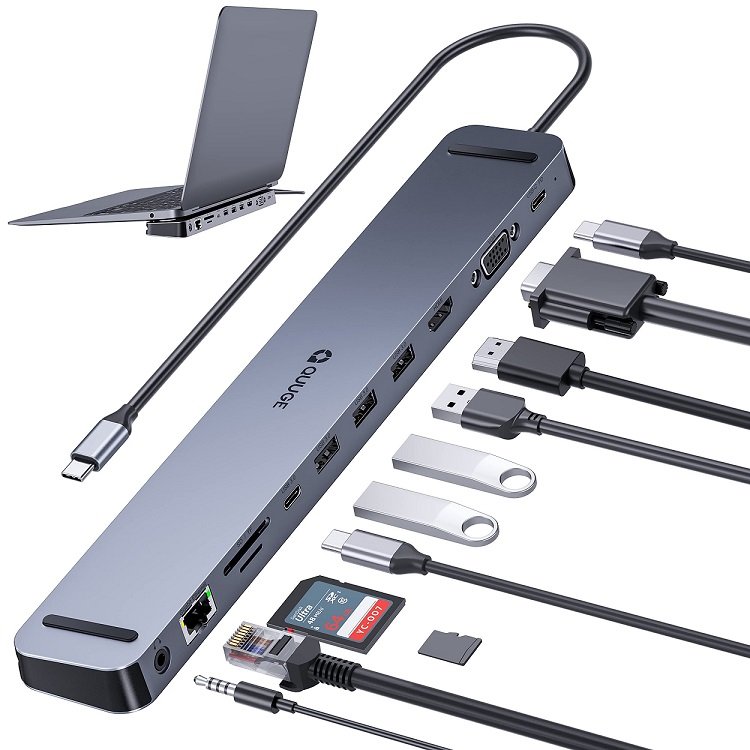A docking station is a device that allows laptops, tablets, or smartphones to connect to it to access additional functionality that would not otherwise be available. These features can include access to additional USB ports, Ethernet connections, video outputs such as HDMI or DisplayPort, audio inputs, and sometimes even access to external hard drives or other storage units. In essence, docking stations turn a portable device into a powerful and versatile desktop-like system, allowing users to connect multiple peripherals simultaneously.
Docking stations are extremely versatile devices in the world of technology, serving to expand the connectivity capabilities of devices such as laptops, smartphones, and tablets, making them more functional in home or professional environments.

How They Are Used
Using a docking station is generally simple and intuitive. For laptops, for example, the docking station connects via a specific port (often USB-C or Thunderbolt) on the laptop. Once connected, the laptop can automatically recognize the docking station and begin using the available ports and connections. Users can connect external monitors, keyboards, mice, cable Internet, and other devices directly to the docking station, turning the laptop into a complete workstation.
For smartphones and tablets, docking stations often provide not only additional connections but also charging capabilities. They may include USB ports to connect to computers or other devices, video outputs to connect the device to external displays, and often SD card slots to expand storage.
A bit of History
The history of docking stations begins with the need to make laptops as versatile as desktops without sacrificing portability. In the early years, docking stations were primarily used in the corporate environment to ease the transition between office and mobile work.
With the advent of faster and more universal connection standards such as USB-C and Thunderbolt, the popularity of docking stations has grown among home users as well.
Considerations for Choice
When choosing a docking station, it is important to consider a few factors:
- Ports and Connections: Make sure the docking station offers the ports you need for your needs (USB, HDMI, Ethernet, etc.);
- Compatibility: The docking station must be compatible with your device, especially if you opt for a brand-specific model;
- Power: Some docking stations provide power to the connected device; check the power to make sure it meets the needs of your device;
- Quality and Price: Consider value for money by reading reviews and comparing different options.
Benefits
Extended Connectivity
The docking station extended connectivity avails way more added ports, thus extending the connectivity of devices with port numbers.
Convenience
For this, they make it easy for a user to attach and remove his device from a whole working setup when moving from mobile to stationary work.
Better Ergonomics
The use of additional monitors, keyboards, and mice in an improved working environment can make workstations more ergonomically sound, minimizing the possibilities of fatigue and muscle strain.
Disadvantages
Docking stations are noted for their high cost, particularly those equipped with numerous ports or those that support advanced, high-speed connection standards, such as Thunderbolt. Additionally, compatibility is a significant consideration; not all docking stations are compatible with every device, which restricts the choices available to users with devices from various manufacturers or models.
Moreover, some docks offer fairly specific connections which may not be available on older or more affordably priced devices. This specificity further limits their applicability and utility across a broad range of electronic devices.
Conclusion
A docking station serves the purpose of converting portable devices into powerful workstations perfectly, with its wide range of connectivity and possibility of enhancing work ergonomics of workstations. But this may prove to be an expensive affair, and sometimes, there arises a compatibility issue with some users. However, one cannot deny the fact that it offers efficiency, convenience, and flexibility.
Whether it’s bringing home the sophisticated setup, charging your simple essentials for work, or enjoying professional or relaxed moments out on the playing field, docking stations are going to be as relevant to the current technology ecosystem.






